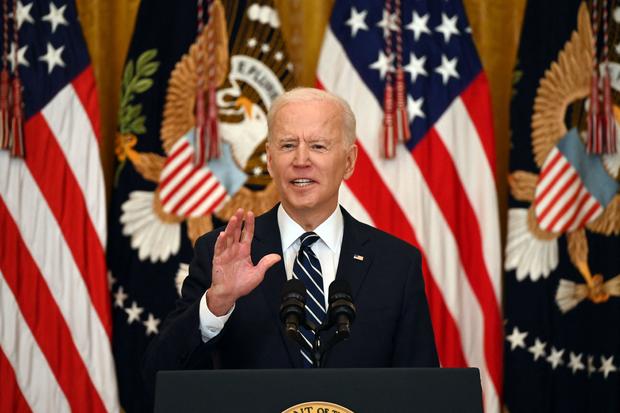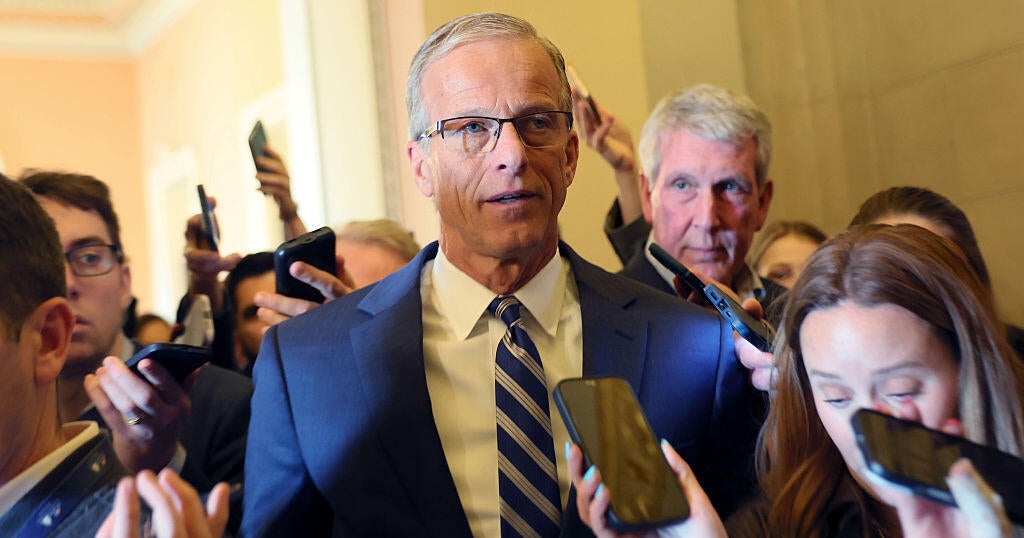Biden signals he's open to eliminating Senate filibuster over GOP "abuse"
Washington — President Biden signaled on Thursday that he would be willing to consider supporting the elimination of the filibuster if Senate Republicans use it to block Democratic legislative priorities from receiving a full vote on the Senate floor. He also advocated the return of a "talking" filibuster, which would require a senator to talk for an extended period of time in order to block a bill.
Most legislation in the Senate requires 60 votes to overcome a filibuster. Democrats hold a narrow 50-seat majority, and most Democratic legislation is unlikely to garner support from 10 Republicans. The filibuster is the biggest roadblock to Democrats achieving most of their legislative priorities.
At his first press conference as president, Mr. Biden said the filibuster was "being abused in a gigantic way." He added that a talking filibuster would force senators "to stand there and talk and talk and talk and talk until you collapse," and then the Senate could proceed with a vote afterwards.
"I strongly support moving in that direction," Mr. Biden said. This would not address the problem of a bill needing 60 votes to advance, and he sidestepped a question about whether he believed it should take 60 votes or 51 votes to break a filibuster.
He also called himself a "practical guy," and suggested that he would be willing to go further on the filibuster if it seemed clear that Democratic priorities like bills on voting rights were not going to receive votes on the floor.
"If we have to, if there's complete lockdown and chaos as a consequence of the filibuster, then we'll have to go beyond what I'm talking about," Mr. Biden said.
Democrats were able to pass their recent $1.9 trillion American Rescue Plan using a process known as reconciliation, which allows certain bills to pass with a simple majority. But reconciliation cannot be used for most types of legislation, setting up an eventual showdown in the Senate over immigration, voting rights and more.
Earlier on Thursday, Senate Majority Leader Chuck Schumer said he would bring a massive voting rights and government reform bill to the Senate floor for a vote, even though it is almost certain to fail due to Republican opposition.
GOP senators claim that S. 1, known as the For the People Act, is a power grab by Democrats, while Democrats insist that they are trying to protect voting rights as several states introduce legislation that could make voting more difficult.
"Across the country, the Republican Party seems to believe that the best strategy for winning elections is not to win more voters but to try and prevent the other side from voting," Schumer said in a speech on the Senate floor Thursday. "That's not America. That's not democracy. And this Senate will take action to protect the voting rights of tens of millions of Americans. The Senate will vote on the For the People Act."
The bill would establish automatic, same-day and online voter registration nationwide. It includes some measures that would require states to overhaul their registration systems. It would expand absentee voting, limit states' ability to remove people from voter rolls, increase federal funds for election security and reform the redistricting process.
Senate Minority Leader Mitch McConnell slammed S. 1 in a speech on the Senate floor moments after Schumer spoke, calling Democratic arguments that it would protect voting rights "utter nonsense."
"That goal is let Washington Democrats rig the rules of democracy from top-down to hide that partisan project behind the smoke screen of voting rights," McConnell said.
The For the People Act may not even receive support from all Democrats, as Senator Joe Manchin expressed skepticism about the bill on Wednesday. He is currently the only Democrat in the Senate who is not a co-sponsor of the bill. Manchin, a moderate Democrat from West Virginia, is also vehemently opposed to eliminating the filibuster.
"I think all of us should be able to be united around voting rights, but it should be limited to voting rights," Manchin told reporters on Wednesday, arguing that S. 1 as it is currently written "might divide us even further on a partisan basis." But if the bill were limited to voting rights, it would strip provisions related to campaign finance and ethics reform, which are key priorities for progressives.
In a lengthy statement on Tuesday, Manchin expressed concerns about S. 1, and said that he would support bipartisan legislation on voting rights.
"As the Senate prepares to take up the For the People Act, we must work toward a bipartisan solution that protects everyone's right to vote, secures our elections from foreign interference, and increases transparency in our campaign finance laws. Pushing through legislation of this magnitude on a partisan basis may garner short-term benefits, but will inevitably only exacerbate the distrust that millions of Americans harbor against the U.S. government," Manchin said.
His statement on Thursday further indicates that he is unwilling to create an exception to the filibuster rule specifically for voting rights, as has been suggested by some Democrats. Manchin said last week that creating such a carve-out would be "like being a little bit pregnant," meaning that it is impossible to only partially change the filibuster.
Some senators have changed their minds on the filibuster as it becomes clear that Republicans will block many bills supported by Democrats. Senator Angus King, an independent who caucuses with Democrats, wrote in an op-ed in the Washington Post on Wednesday that "supporting the continuation of the rule becomes harder and harder to justify" if the minority uses the filibuster as a tool for obstruction.
"All-out opposition to reasonable voting rights protections cannot be enabled by the filibuster; if forced to choose between a Senate rule and democracy itself, I know where I will come down," King wrote. He quoted Democratic Senator Raphael Warnock, who said in a speech on the Senate floor recently that "it is a contradiction to say we must protect minority rights in the Senate, while refusing to protect minority rights in the society."
Warnock argued on Thursday that it is critical to pass S. 1 to counter a bill signed into law by Georgia Governor Brian Kemp on Thursday that includes new restrictions on voting by mail. Critics say that the bill will disproportionately affect people of color, making it more difficult for them to vote.
"Instead of adjusting their message, some Georgia politicians have decided to rewrite the rules with SB 202-a thinly-veiled attempt to suppress the vote. It's Jim Crow in new clothes. We will not go back. And Congress must act to protect the sacred right to vote," Warnock, who represents Georgia, wrote on Twitter.
Senator Kyrsten Sinema has also said she is against eliminating the rule. Unless she and Manchin change their minds, most of the progressive legislation proposed by Democrats will remain in limbo.
In a letter to Democratic colleagues on Thursday, Schumer also said that the Senate Judiciary Committee would soon take up the John Lewis Voting Rights Act, which would restore provisions of the 1965 Voting Rights Act struck down by the Supreme Court. Like S. 1, it is unlikely to receive the needed support from 60 senators.
Schumer added that the Senate will take up the Equality Act, which would enshrine legal protections for LGBTQ Americans, and COVID-19 hate crimes legislation proposed by Senator Mazie Hirono aimed at protecting Asian Americans from violence and discrimination.
He also said that the Senate would take up gun control legislation and bills related to climate change, both of which are unlikely to garner Republican support.
"The challenges our country still faces are immense, and there is no reason both sides cannot work together on issues that will affect our country and our children's future," Schumer said in his speech on the Senate floor. "We won't agree on everything, but we must agree that inaction is unacceptable. The Senate must help the country finish the job against COVID while continuing to build a more equal economy and a more just society."




